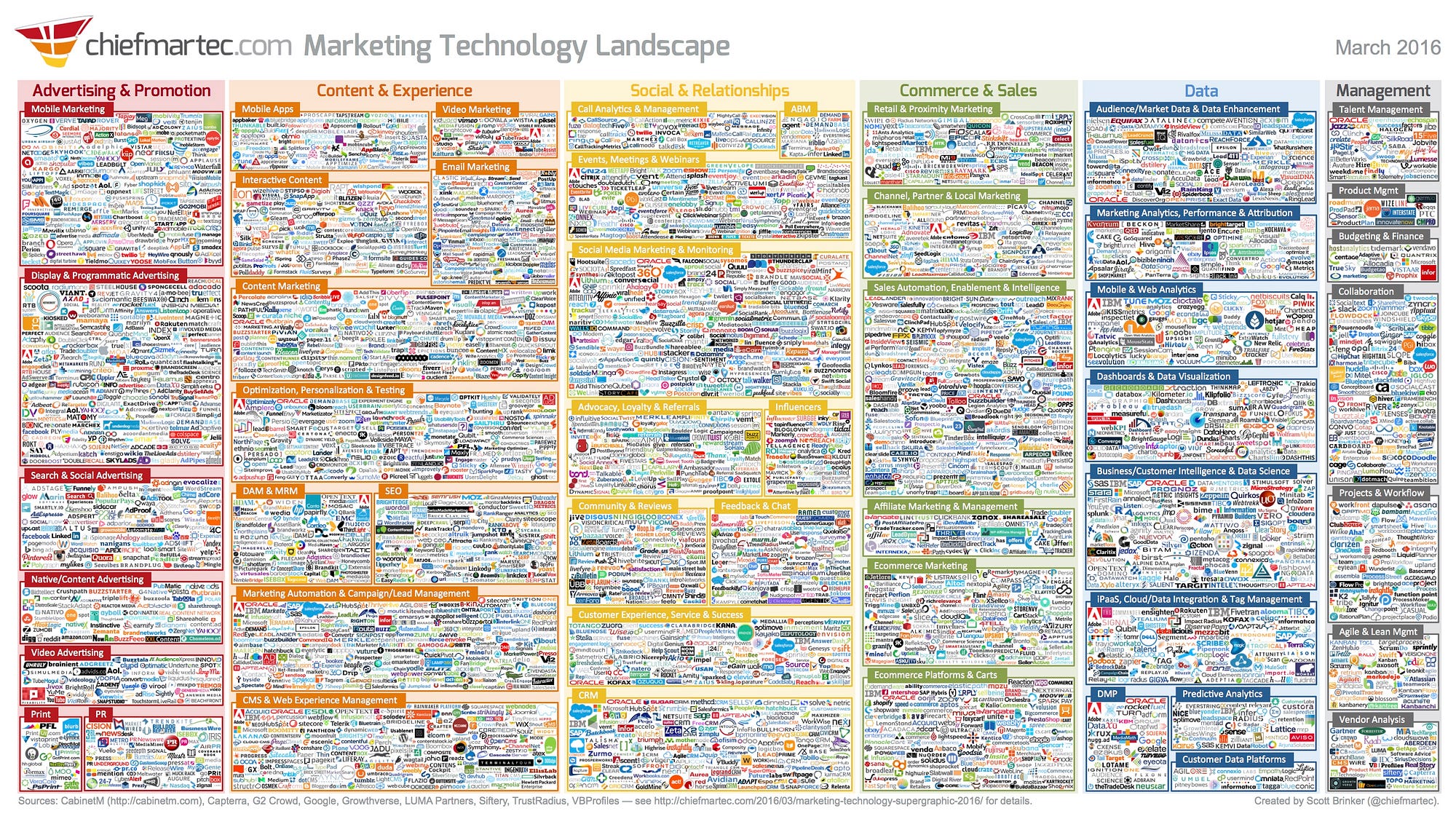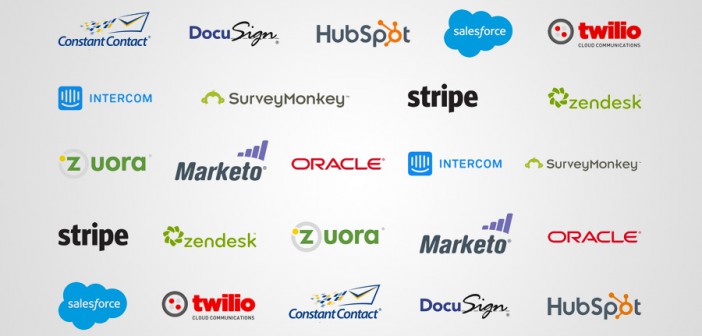Want To Dominate Your Market? Pick A Word.
One word can change the direction and outcome of your conversation. Elizabeth Stokoe, a British scientist and Professor of Social Interaction,found in her experiments with mediation services that changing a single word in the question can lead to more positive outcomes.
““Willing” was significantly more effective than other phrasing such as “might you be interested in mediation?” — and it was the only word that achieved a total turnaround from “no” to “yes.””
What if the focus on a single world could make the difference between being the market leader and being apart of the rest of the field?
According to the Chief Marketing Technologist Blog (Scott Brinker), the marketing ecosystem grew to ~1000 companies in 2014, to ~2000 in 2015, and to ~3500 companies in 2016 (more detailed view). These numbers only cover the marketing ecosystem. Making a buying decision in a busy CRM market can be even more overwhelming, and we are not even discussing the whole sales enablement vertical.

But, how many marketing or sales enablement companies can you recall of the top of your head?
My guess is that only a few of you can name more than a dozen companies in each vertical.
What differentiates the market leader from the rest of the field? Why is it easier for us to recall some companies more than others?
Market leaders establish a strong position in the mind of the prospect by focusing attention on very small amount of information.
Market leaders find a way to own a word. In our over-communicated society, less is more.
This concept of focusing on one word for positioning companies was first brought up by Al Ries in his 1981 classic, “Positioning”. For a very long time, top consumer brands took advantage of this simple positioning method. Yet, unlike consumer brands, enterprise software companies mostly ignored the laws of branding and positioning, which have accumulated in the last century. Ever since the SaaS business model became widely accepted in the enterprise software world, most of the differentiation between products was around SaaS vs. on-premise, cheap vs. expensive, less features vs. more features, easier to setup vs. harder to use.
However, top enterprise software companies are building strong brands and increasing market share by focusing their marketing efforts on controlling and owning one word in the prospects’ minds.
Earlier, when I asked you to name a list of companies in the marketing or sales vertical, most of the companies you were able to recall own a word association that makes it easier for you to recall them.
Let’s look at a few enterprise software leaders and see what word each of them owns.

Salesforce owns “CRM.”
It is difficult to think of the term Customer Relationship Management (CRM) and not to think of Salesforce. In a conversation, “We need Salesforce” and “We need CRM” can be used interchangeably, and the sentences will not lose any meaning. Over the last 16 years, Salesforce has build an empire which consists of products in many categories but their secret to success is the clear and consistent focus on one word: CRM.

Oracle owns “database.”
Over a few decades marketing strategies have changed and Oracle got into new markets. They were one of the first established companies to migrate to the cloud applications. There is just one word that drove Oracle’s market domination:database. You think Oracle, database comes to mind and vise versa.

Marketo owns “marketing automation.”
Marketo was not the first company in the marketing automation market. Eloqua was one of the first. However, the brilliant naming and focused marketing allowed Marketo to claim the “marketing automation” term. And what an amazing job founders did with naming — Marke-to — sounds like a combination of “marketing” and “automation” terms.
HubSpot owns “inbound.”
Very rarely you will find a better example of company inventing the term, popularizing it, and completely dominating it. Claiming a word is hard enough, making up a term and bringing critical masses to use it as the industry standard — almost impossible. Hubspot claimed the word, “inbound,” with a state-of-the-art marketing strategy. They went on a complete content warfare with marketing ecosystem and as a result dominated the “inbound marketing” term and then just “inbound”.

SurveyMonkey owns “survey.”
Being one of the first on the market helps you claim the territory. And surely, the name also helps. You’ve heard multiple times when team discusses sending out a survey and doesn’t mention any tool. Everyone assumes SurveyMonkey as default solution. If you don’t name any specific solution for conducting survey, surely it will be SurveyMonkey.

Constant Contact owns “email marketing.”
This might not be so obvious but since Constant Contact has been around for a while their consistent focus on email marketing in positioning and messaging allowed them to own email marketing. If you think otherwise, just type “email marketing” in Google search and see what you get as the first search result.

Zendesk owns “customer support.”
In a very busy customer support software space, Zendesk stands alone at the top. Zendesk dominates the word, “customer support” , not customer services or customer experience but customer support. When you think of Zendesk you think of a customer support ticketing software. Such focus on the “customer support” phrase makes it easier for Zendesk to keep Desk.com (which is owned by Salesforce) at bay.

Intercom owns “customer communication.”
Zendesk and Intercom may compete for the same customers but because of the brilliant positioning job by Intercom they were able to enter the market on the border of a couple of industries. They took some market share from customer support vertical, a little from email marketing, and a little from the pool of companies that help communication with customers (website chats are in this category). You have to admire how well Intercom entered market with clear messaging while merging concepts from three different markets.

Zuora owns “subscription billing.”
This is a tougher one. Many will argue about whether Zuora actually owns “subscription billing” since so many competitors are breathing down their neck. However, Zuora was one of the first ones on the market before subscription economy was well-understood term in the industry. Because so many competitors bet on “subscription billing” as well, Zuora’s ownership of this term is not quite as crystal clear as some of our other examples. The reason why it may not be so obvious that Zuora clams “subscription billing” is because many competitors bet on this term as well. Challengers in this industry should pick a differentiated term, for example Chargify can own “secured billing” .

DocuSign owns “e-signatures.”
DocuSign is not necessarily the best e-signature product in its category, but thanks to focused positioning and marketing DocuSign means e-signatures. One way to test whether company owns a term is by asking your team member to decide on e-signature software. 9 times out of 10 they will go with an industry standard, a solution that associates with the word the most.

Twilio own “text messaging API.”
Hey, hold on, do they own not just one word but three? Yes, I guess hard core developers can’t keep it too simple. “Text messaging API” is still a simple enough phrase to understand. As a result, everyone knows what Twilio does, and everyone is clear about their positioning. Recently, Twilio started focusing on “communication API” — natural evolution to a more broader term.

Stripe owns “payments API.”
Paypal owns “payments” in consumer market. Stripe focused on the business market and developers as primary users. Adding API to payments was enough to dominate their marketplace. It fits very well with overall product strategy.
A few other examples of well-know companies owning a word in our minds:
Google owns “search.”
Facebook owns “social.”
Amazon owns “everything store.”
AWS owns “cloud.”
A few companies are in the process of capturing minds of consumers by owning a word:
Slack is claiming “team messaging.”
Zenefits is claiming “all-in-one HR.”
Gainsight is claiming “customer success.”
What word does your company own? What do you do if your competitor already claimed the best word in your industry?
One way to develop a new word or phrase to own is mix and match. Remember how Intercom was able to position itself in the crossroads of three industries by using “customer communication” phrase.
A good example can be found in CRM market; while Salesforce owns CRM term, smaller players claim words that differentiate them from the leader. For example, Pipedrive claims “sales process” oriented CRM; while Pipeliner focuses on the “visual CRM” term. (If the Pipeliner CRM homepage was focused more on “visual CRM” positioning message, it could help them against competitors).
Sidenote to teams at Pipedrive, Pipeliner, and PipelineDeals:
Hey guys, if you are reading this do yourself a favor and re-brand; many customers confuse you. Imagine prospect receiving a first cold call from your SDR, he/she might want to check out your product later …. It was Pipe something… Pipesales? Pipedeals? Pipesaler? Pipedriver? Pipeliner? Pipedrive? Kill me softly! I just wasted so much mental energy, I need a coffee break.
Pick a word or phrase that no other company in your space claims. If generic terms are taken, try to mix and match terms from related industries. Dominate a word that describes your competitive attribute.
Got yourself a word? Now, start developing content strategy to communicate your market positioning, it will improve your marketing ROI and differentiate you from “me-too” approach to content.


